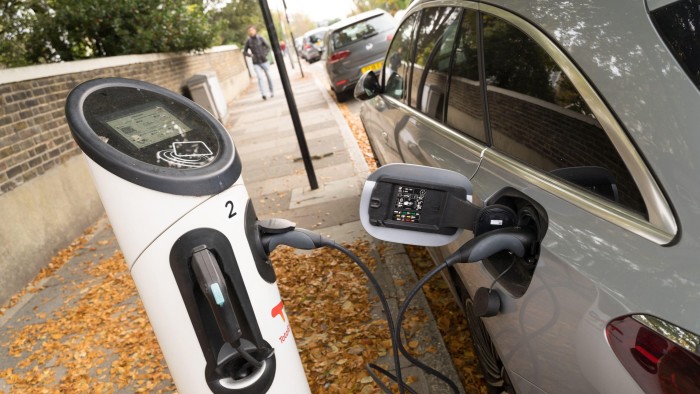Stay informed with free updates
Simply sign up to the Electric vehicles myFT Digest — delivered directly to your inbox.
Car industry executives have lashed out at UK government plans to introduce a pay-per-mile tax for electric vehicles, saying the expected move could derail an already bumpy transition away from petrol vehicles.
Under one proposal being considered by chancellor Rachel Reeves, drivers of EVs could face charges of 3p per mile in addition to other road taxes, starting in 2028, according to people familiar with the matter.
The average EV driver would pay an extra £250 a year, compared to about £600 a year in fuel duty for the average owner of a petrol or diesel car, the people briefed on the government’s plans said.
Ministers have been considering road charges for EVs for some time to offset a decline in revenue from fuel duty, but the car industry was still taken by surprise by reports of the government’s plans.
“That is definitely bad,” Håkan Samuelsson, chief executive at Volvo Cars, said in an interview when asked about the possibility of a new EV tax. “Don’t go from incentivising something and pushing it with legislation to start to put on penalties and tax on top of a positive development.”
The discussions come as sales of battery-powered vehicles have surged in the UK on the back of a new government subsidy scheme to increase EV purchases.
UK sales of EVs have increased nearly 30 per cent this year compared to a year earlier, with one in four new cars sold in October being a fully electric model, according to data released by the Society of Motor Manufacturers and Traders on Wednesday.
The government requires carmakers to sharply raise the percentage of their EV sales each year, with the target set to increase from 28 per cent this year to 80 per cent in 2030.
Despite the recent rise in EV sales, James Court, head of policy at Octopus Electric Vehicles, said introducing road charges for EVs now would be “far too soon” since they still represent only 4 per cent of cars on the road.
The idea of a pay-per-mile tax for EVs scheme is mostly untested outside Iceland and New Zealand.
“As we’ve seen in other countries, introducing a charge now would stifle the growth we’ve seen over the past years, and be self-defeating,” Court said.
Sales of EVs fell sharply in Iceland after it introduced a road tax for electric and hybrid vehicles last year, while a similar decline in demand followed New Zealand’s launch of “road user charges” for EVs and plug-in hybrids the same year.
The expected move in the Budget on November 26 appears to be motivated by the chancellor’s need to fill a hole in the public finances estimated at between £20bn and £30bn by the end of parliament.
In a report released in 2023, the Resolution Foundation think-tank recommended charging EV drivers 6p per mile — the same as petrol and diesel drivers — to offset the fall in fuel duty revenues and using the GPS data inside the EVs to collect the new duty. It estimated that the EV transition would create a £10bn revenue shortfall by the early 2030s.
Jonathan Marshall, who wrote the report, said the government was facing a major challenge next year with Reeves expected to cancel a “temporary” 5p cut in fuel duty introduced in 2022 — which she had originally planned to do last year.
Marshall said the plan to introduce a 3p per mile road tax was a “good first step” to get the public used to the idea of having to pay that kind of levy for EVs.
“The key test for this is that they need to do something before the use of electric cars is more common on the roads, and before the black hole in fuel duty revenues becomes too bad,” he added.
But Stephen Glaister, emeritus professor of transport at Imperial College, said a similar system trialled in Oregon in the US had not been a major success. “The UK government will need to find a technology that works for them, which could be very tricky and might be expensive,” he added.
Whatever Reeves decides, most experts agree that the current system for taxing motorists needs to be reformed and that EV drivers should pay for their use of the roads.
Glaister said there was an argument for raising fuel duty at the same time as introducing an EV road tax, as it would lead to “more revenue for the exchequer and would also mean that you don’t de-incentivise the purchase of electric vehicles”.
Matt Galvin, UK managing director for electric-car maker Polestar, said it was “farcical” that fuel duty on petrol and diesel cars had not been raised since 2011. “Our government should not be taking their focus off decarbonising our roads.”




